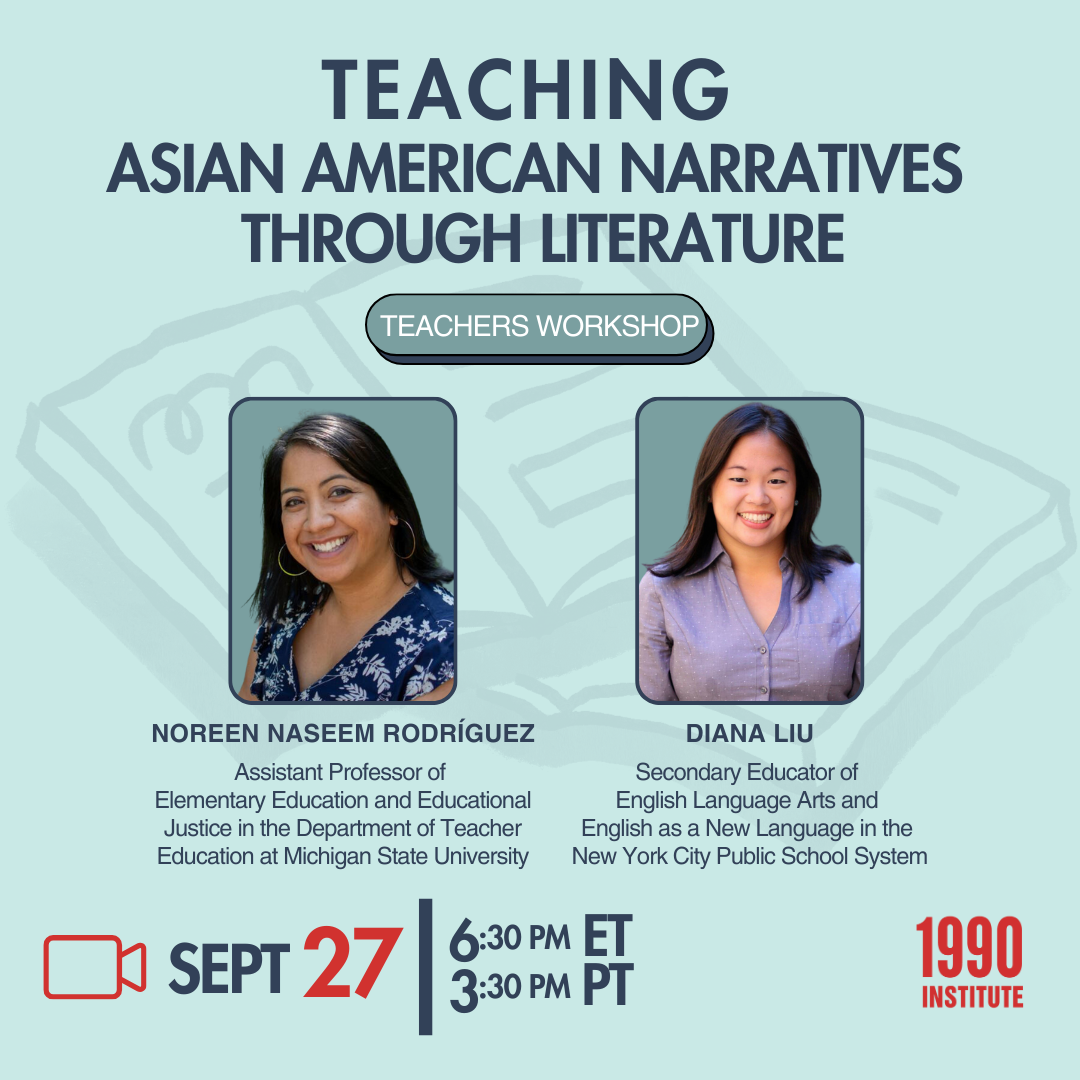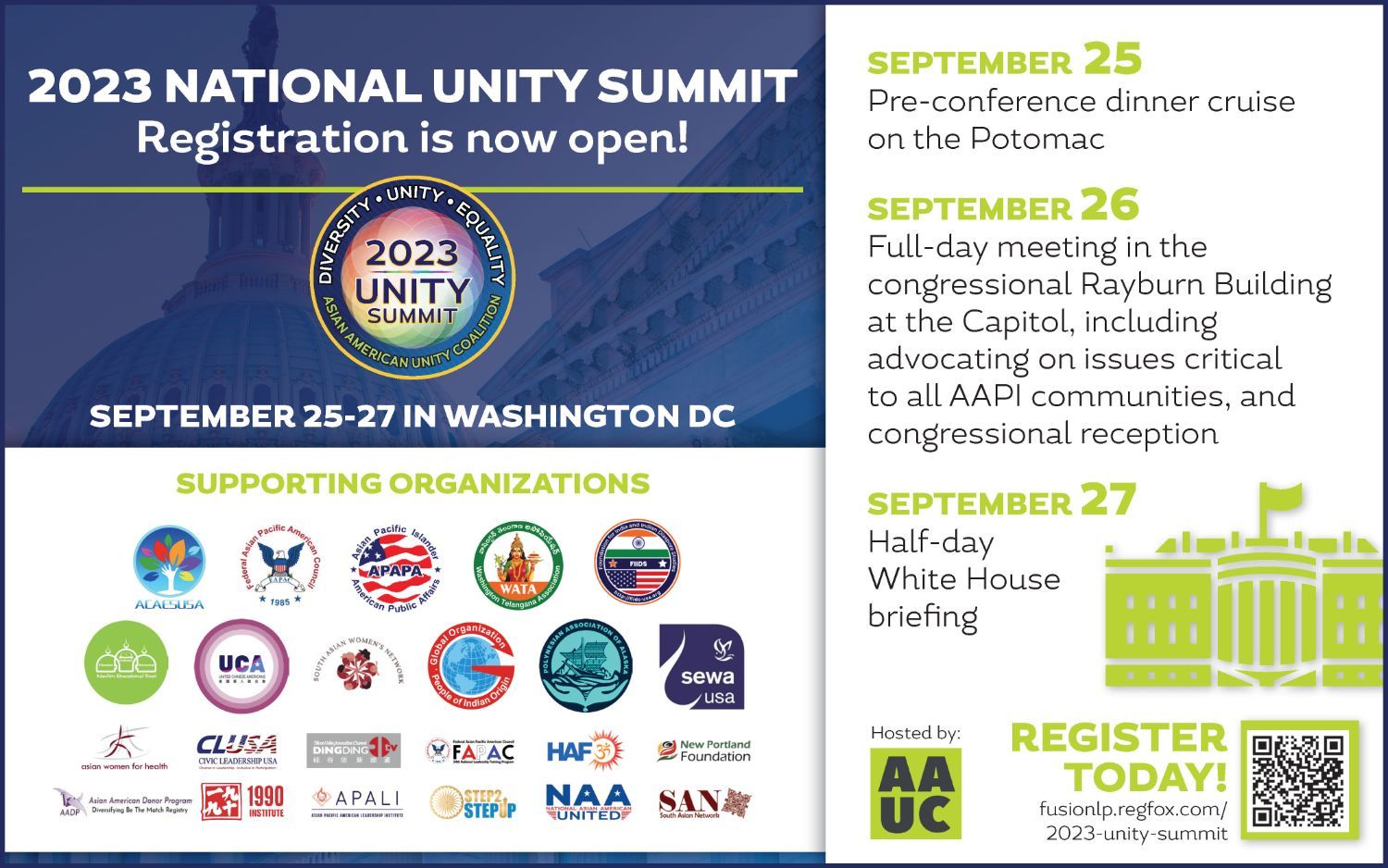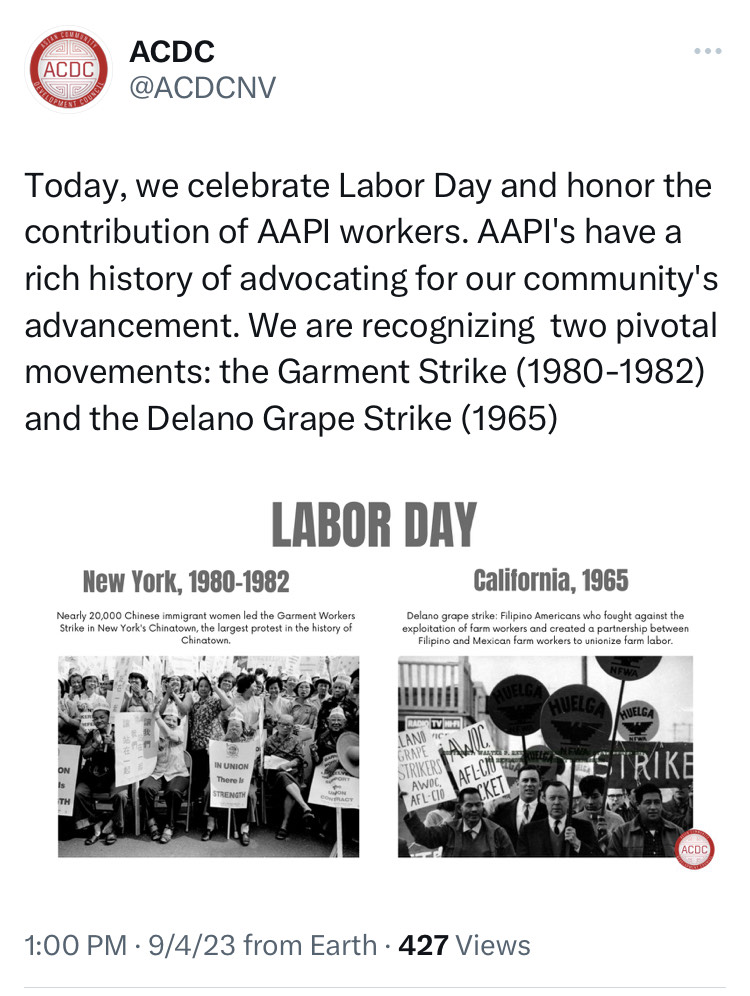| | | | Dear Friends, What books influenced your perspective when you were in school? Did you read stories about people from a variety of backgrounds? When you immerse yourself in a good book, even if the story is about someone who may seem dissimilar to you, your world is opened to different perspectives and you can recognize our shared humanity. On September 27, you’re invited to our Teachers Workshop titled "Teaching Asian American Narratives Through Literature." Our panelists include a teacher educator and a secondary school educator. This workshop is designed to equip middle and secondary school educators with valuable insights they can pass along to their students about Asian identity, history, and issues through literary works, with consideration to the intersectionality of race, ethnicity, gender, and other characteristics. Registration is free and open to all. See Spotlight below for more details and to see all that’s new at the 1990 Institute. And if you love our resources and content, please donate to help us continue, and please share this newsletter with your friends and family and encourage them to subscribe. |
| |  |
|
| Teachers can help foster nuanced dialogue on intersectional perspectives in literary discussions that encourage inclusive community building in the classroom and beyond. Register to learn best practices for including oft-missing Asian American perspectives in “Teaching Asian American Narratives Through Literature.” |
| | The power of communal responsibility By Frances Kai-Hwa Wang
The end of summer brings Ghost month and the Hungry Ghost Festival, a Taoist (Zhongyuan festival) and Buddhist (Yulanpen festival) tradition marking the time when spirits return to the land of the living to visit their families. Families honor and feed their visiting ancestors with food offerings, incense, and burning of ghost money. One aspect of the festival that I like is that one not only feeds the dead in one’s own family, but also takes care to feed the dead who do not have families to provide for them in the afterlife. In this way, it is a smart strategy and a communal responsibility for all of us. Although this communal responsibility is motivated by fear (of ghosts), it is a good reminder of the power of working together, especially when results may seem slow in coming. Last month, thousands of people came together to commemorate the 60th anniversary of the 1963 March on Washington for Jobs and Freedom, and to once again call the country to action against white supremacy and disinformation, and to uphold the collective values of freedom, equality, justice. The 1963 march was where Dr. Martin Luther King, Jr. gave his “I have a dream” speech, and it became a turning point in the civil rights movement, leading to the passage of the Civil Rights Act of 1964 and the Voting Rights Act of 1965. Today, we are still fighting for many of the same things. The 1990 Institute is encouraged by Asian Americans Advancing Justice - AAJC serving as the first Asian American organization to co-chair this historic march, and we stand alongside our fellow Asian American, Native Hawaiian, and Pacific Islander (AANHPI) organizations to unite in solidarity with all communities of color to ensure equity for all. Later this month, Climate Week NYC will bring together people from around the world to tackle questions of how to move climate action across the globe faster, how to make sure known solutions are implemented in different countries, and how to use the collective will of the climate community to remain inspired. Climate change disproportionately impacts vulnerable and disadvantaged communities around the world, and communities and countries need to come together cooperatively and quickly in what has been dubbed climate cooperation. Both the U.S. and China and how they can work cooperatively will certainly be part of the conversation at Climate Week NYC. The 1990 Institute joins Justice is Global, Quincy Institute for Responsible Statecraft, and ActionAid USA to host a town hall event, “Organizing for Climate Action: the Opportunities of U.S.-China Cooperation," on September 27 with speakers Rep. Jamaal Bowman (NY-16 Congressional District); Brandon Wu, Director of Policy and Campaigns, ActionAid USA; Russell Jeung, Professor of Asian American Studies, San Francisco State University, and Co-founder, Stop AAPI Hate; Terry Fitzgibbons, Veteran and organizer, Veterans for Peace; Sandy Shan, Executive Director, Justice is Global; and Jake Werner, Research Fellow, Quincy Institute for Responsible Statecraft. Register here. |
| |
|
|  | Are you attending the National Unity Summit, organized by the Asian American Unity Coalition (AAUC), in Washington DC? The 1990 Institute’s Board Chair Grace Yu will speak on teaching AANHPI history in a panel discussion on September 26. |
| | |
|
| Wayne County principal criticized for ‘racist response’ to UNC shooting on Facebook | CBS17 A post from a North Carolina school principal has spread online and is getting backlash for being a “racist response” to the shooting at UNC-Chapel Hill. The 1990 Institute denounces blanket racist rhetoric built and based upon anti-China messaging from American media and politicians who have made everyone skeptical of people with ties to China. While predictable, we are saddened to see this from a public school principal, and we would encourage any and all administrators and educators to use our videos and resources to better understand the everyday Chinese citizens, who have similar hopes and dreams as Americans. UNC police got the wrong Asian while searching for suspect, intensifying fears of racial profiling | NBC News Local media outlets showed coverage and shared accounts of an Asian man in handcuffs who was later let go even though the 911 caller immediately identified the suspect in the UNC shooting. The victim is being remembered as a passionate colleague and father. Students finding their voices in ethnic studies | East Bay Times More than 300 San Francisco Bay Area schools are offering courses on ethnic studies, even though California will not require it to be taught until 2025. Despite that, ethnic studies is far from universally accepted. The 1990 Institute creates and curates robust educational materials that secondary school teachers can use when teaching AAPI studies. Future of cooperative U.S.-China science agreement is in doubt, say American physicists | South China Morning Post Two Stanford professors who sent a letter from fellow scientists to President Joe Biden, urging the deal's renewal, say partisan politics is driving Washington’s change. The U.S. State Department is extending the agreement, which was initially signed in 1979, for just six more months. Slew of new landownership bills are reminiscent of anti-Asian Alien Land Laws | NPR More than 30 states have introduced several dozens of bills aimed at restricting U.S. land ownership for Chinese citizens and businesses, evoking memories of so-called alien land laws in the 1900s. How high tensions between China and the U.S. are impacting American companies |NPR Tensions between China and the U.S. are running high — and that's leaving American companies having to carefully navigate their approach to a key player in the global economy. U.S. Commerce Secretary discusses trip to China amid military and economic tensions | PBS NewsHour Commerce Secretary Gina Raimondo discusses her trip to China during a time of security and trade tensions between the two global giants and China's ongoing economic slowdown. A race for autopilot dominance is giving China the edge in autonomous driving | MIT Technology Review Electric vehicle makers and AI companies are taking Tesla FSD-like (Full Self-Driving) systems to China, but it’s still out of reach for most consumers. As the 2024 election revs up, Asian Americans rise as a powerful voting bloc ] NBC News They're America’s fastest-growing demographic, and they delivered a turnout jump in swing states that proved crucial to Joe Biden's victory in 2020. Both parties have taken note. An effort to ban caste discrimination in California has touched a nerve | Politico California will be the first state to explicitly ban the practice, but the process has been divisive. The History of Asian American Labor Activism Is Essential for Today’s Students | Ms. Magazine Despite centuries of racially discriminatory laws, Asian immigrants and Asian Americans have consistently engaged in labor resistance. US Supreme Court asked to decide if high school admissions policy discriminates against Asian Americans | Jurist Parents filed a petition asking the U.S. Supreme Court to decide whether Thomas Jefferson High School for Science and Technology, an elite public high school, discriminates based on race in its admissions policy. |
| | Who’s your favorite author in Asian American literature? Join us all month as we feature Asian American authors and their notable works on New Asian American Voices. First up is Amy Tan. |
|
|
| |
|
| | - YOU'RE INVITED TO OUR TEACHERS WORKSHOP: “TEACHING ASIAN AMERICAN NARRATIVES THROUGH LITERATURE” – Integrating Asian American perspectives into English Language Arts and Literature classes involves actively involving students in discussions that delve into topics such as immigration, assimilation, racism, economic challenges, and justice, as well as familial and ethnic pride, resilience, and joy, as seen through Asian American experiences and voices. By incorporating a range of viewpoints from different backgrounds and using an interdisciplinary approach, educators can deepen students' knowledge of the vibrant cultural tapestry within our communities as well as enrich their understanding of material across their classes. “Teaching Asian American Narratives Through Literature” is designed for middle and secondary school educators but open to all. Our panelists will discuss using Asian American literature in classrooms to spark meaningful discussions on Asian identity, history, and issues, with consideration to the intersectionality of race, ethnicity, gender, and more. Register now to reserve your spot at our webinar on September 27 at 3:30 pm PST / 6:30 pm EST.
- REGISTER FOR THE NATIONAL UNITY SUMMIT ON SEPTEMBER 25 TO 27 – The Asian American Unity Coalition (AAUC), a nonprofit of which the 1990 Institute is a member organization, is organizing the 2023 National Unity Summit on September 25 to 27 in Washington DC. The summit aims to create a community platform for all AANHPI organizations and leaders to interact, work together, learn from each other, and build trust so that the community will be strong via UNITY. The event will feature keynote speeches from bipartisan political leaders, community activists, and promising young leaders. The AAUC will be advocating on bills regarding civil rights, immigration, racial discrimination, no hate crimes, and teaching Asian American history for a congressional visit on September 26. It will also launch the AAPI Community Hub project during the summit which can connect all 20,000+ AAPI nonprofits in all 50 states. Registration is free for a limited time. Scroll down to learn more about the conference agenda here and don’t miss the September 26 event on "AANHPI History Education" with 1990 Institute's Board Chair Grace Yu.
- LEARN ABOUT ASIAN AMERICAN AUTHORS ON NEW ASIAN AMERICAN VOICES – As part of our efforts to support the attendees of our Teachers Workshop on “Teaching Asian American Narratives Through Literature” with additional resources, our program spotlighting Asian American stories, New Asian American Voices, is featuring Asian American authors in September. Whether these authors are celebrated trailblazers, such as Amy Tan (The Joy Luck Club), or are well-known to a smaller group of lucky fans so far, such as John Okada (No-No Boy), we will be uplifting noteworthy Asian American writers and their literary works all month. We will also have lesson plans, discussion guides, and more resources related to this topic for secondary school teachers and students. Be sure to register for our September 27 Teachers Workshop to receive access to all the resources.
|
| | Dim Sum - A Little Bit of Heart |
|  | |
|
|
|
| | | | 1990 Institute
P.O. Box 383 | San Francisco, California 94104
contact@1990institute.org www.1990institute.org Copyright 2023 The 1990 Institute. All rights reserved. |
| | | |
|
| |
|
|